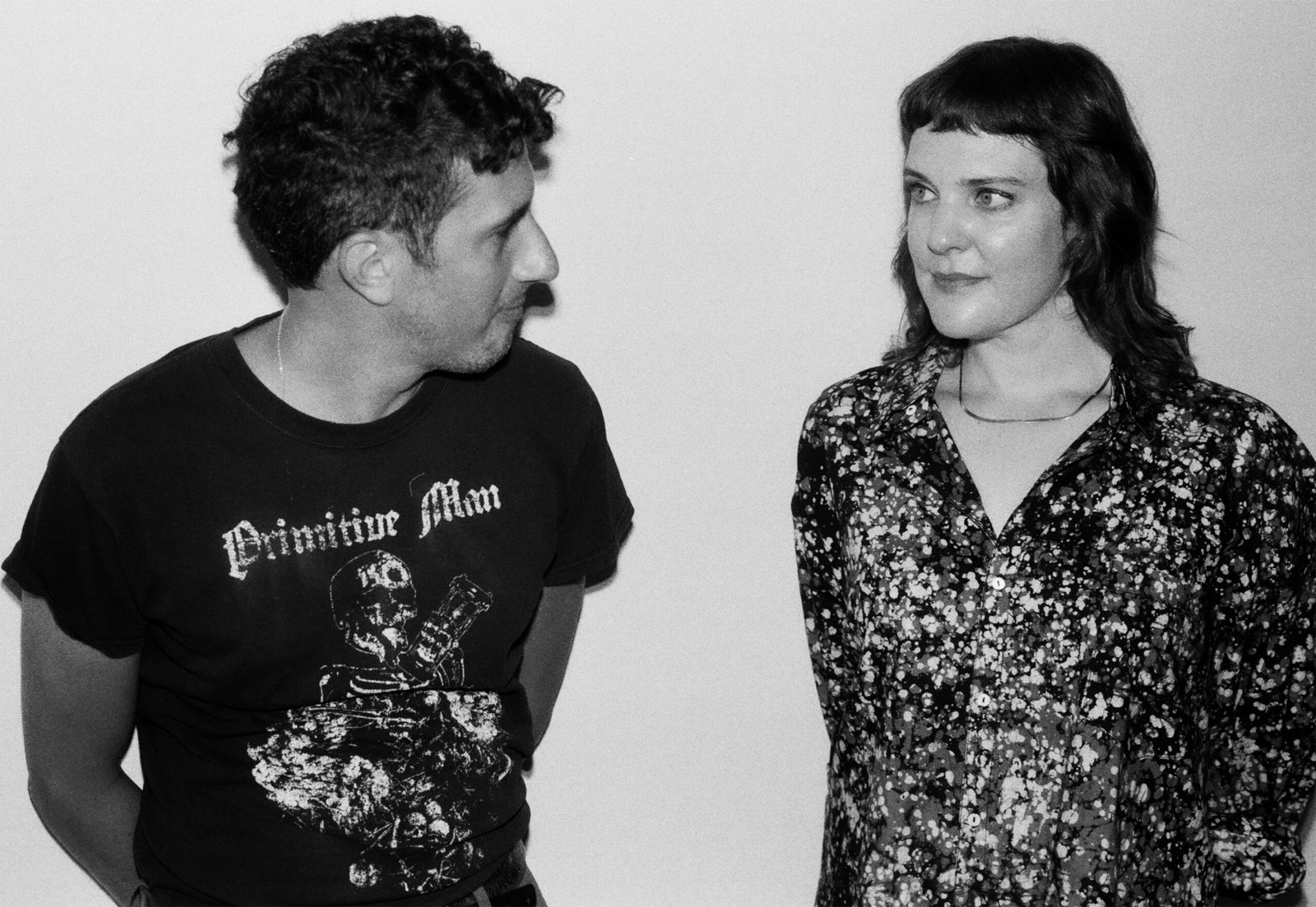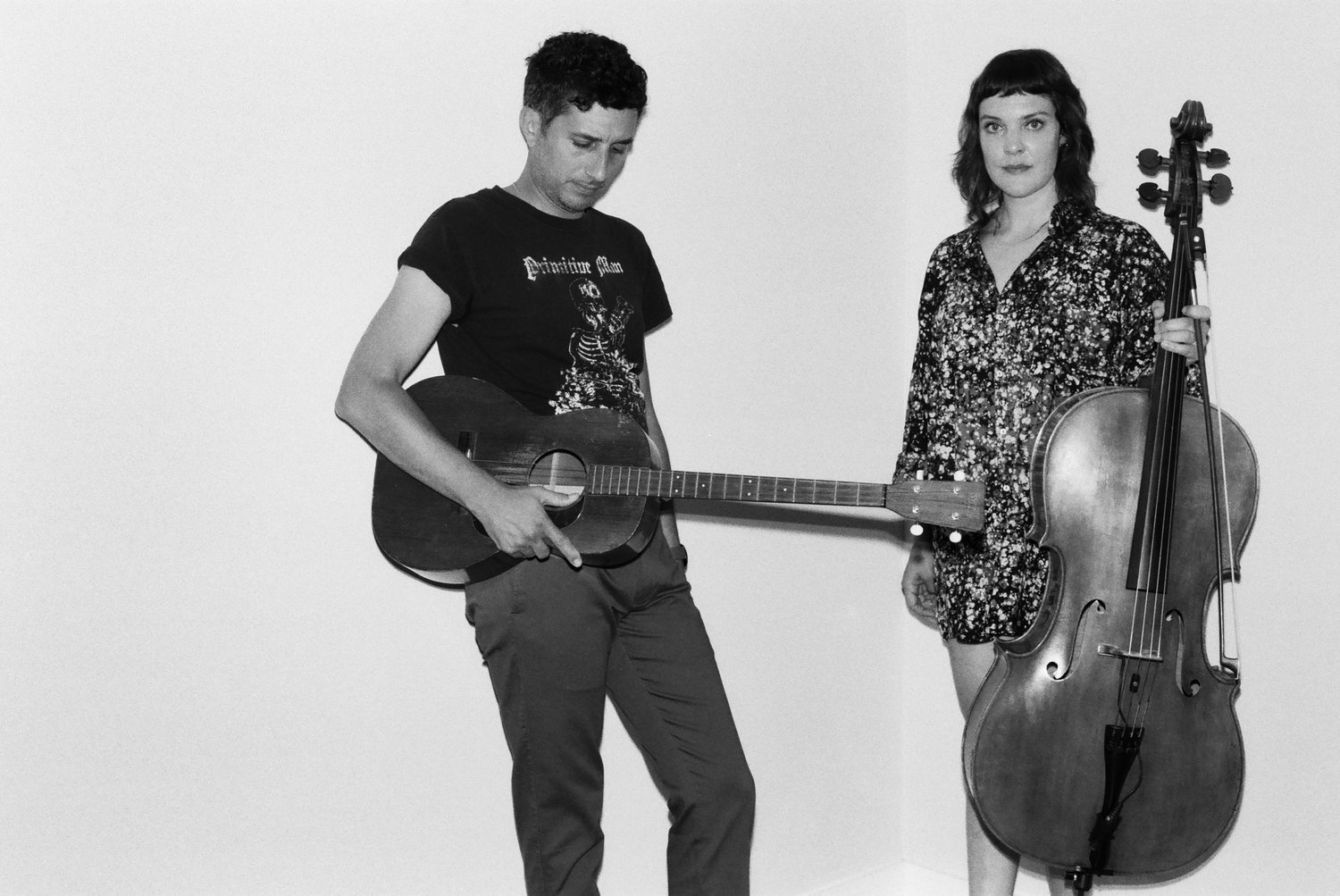Whatever you do, don’t call Quarterly pretty. It may be tempting to use that word when exposed to the mellifluous sounds of Christopher DiPietro’s nuanced finger-picked guitar and his wife Kristen Drymala’s emotive cello, but don’t be lulled into a false sense of security. The acoustic duo’s music exists on the periphery of human existence, filling the spaces that words can’t quite describe, for each gentle touch of steel strings or bow across the body of the cello resonates at a frequency that goes well beyond how one would describe a tiger lily or a ring-bearer’s dress. It’s tempting, but it’s not where the heart of the Brooklyn-based duo is planted.
That’s not say the music of Quarterly is ugly- there may be notes of dissonance and attack- but ugly isn’t an appropriate word, either. Perhaps that’s it: any tenth grade English student throwing around pretty or ugly as adjectives in their personal essay isn’t digging any deeper than that landscape painting hanging on a hotel room wall. And what Quarterly is doing is digging deep. The sonic tendrils of their thoughtful, elegant compositions go way beyond the thin stratosphere of our daily lives and reach right down to what it means to live and be human and part of a place. Perhaps the music of Quarterly is the soil in which beauty erupts: not beautiful unto itself, but beautiful simply because it exists.
And like most beautiful stories, Quarterly‘s story begins with a boy and a girl, a big city, and some cool music. Drymala was playing cello in the Boston chamber pop band Gem Club, a band that had modest regional success in New England, getting picked up by Hardly Art, a subsidiary of Sub Pop. DiPietro was playing local bars as a solo musician, crafting intricate songs on the acoustic guitar along with vocal melodies. DiPietro says, ‘The guitar stuff I was writing was kind of complicated. Not totally mathy, but it had a lot of finger-picking and stuff. So the set that I was writing then was partly just strumming chords and singing, which was the only thing I could do that way.’
Self-deprecating and humble, DiPietro seemed to be a star-crossed fanboy when he met his partner- he’d seen Drymala perform with Gem Club and was understandably infatuated, often helping them cart their gear. Drymala adds, ‘I was playing a lot with Gem Club. We had some buzz, did a tour, even a Tiny Desk Concert type of thing. But Chris had these songs that were already written, and he was interested in adding some bass. So that’s kind of the first thing we did: me adding to what he had already created.’
This led to the duo’s first recording, fleshing out some of the tunes DiPietro wrote on guitar with the heavy bass sounds of Drymala’s cello. 2013’s Yellow Rose EP begins with the audacious fifteen minute guitar piece “Bullseye Bouquet”, DiPietro’s guitar conjuring up memories of a Windham Hill-era Will Ackerman with a simple straight-to-tape punk rock mentality. ‘The first half of that record is like one long, wandering guitar instrumental, but it was fun. It was a way to get to know each other as players,’ DiPietro mentions. Recorded in a day for two hundred bucks at The Soul Shop in Medford, Massachusetts, the album comes off as organically warm. You can tell the duo are just finding their grounding as a musical partnership: the songs aren’t so much about what each can bring to the table as it is about both of them trying to figure out what configurations work. Much like any relationship, the album is exciting and innocent in it what is clearly just the beginning of a marriage of two disparate, yet remarkably complementary, sounds.
If Yellow Rose was the sound of the band just sprouting up from the dark loamy soil of the Earth, their second record, the self-titled Quarterly, is the sound of the duo reaching for the sun. Recorded over several days at The Soul Shop, the album takes advantage of the time it takes to prune and fertilize each composition so they’re ready to bloom. DiPietro described the sessions as such:
‘I still like the core of these songs- I brought the pieces to the table because some of those guitar parts were part of the set I was singing to, and I wasn’t sure what I was doing, to be honest. But the cello really exploded how thought about those songs.
‘The second half of it is all electric Telecaster. I was listening to Earth a lot and wanted it to be more expansive with reverb and things like that. And that was perfect for what Kristen was doing in Gem Club: so much reverb, so much delay. Super atmospheric, you know.’
The self-titled album is where the band really taps into the dark side of their sound- the sun going down, photosynthesis in reverse, a restoration of sonic energy. Some songs, like the melancholy “Bell Suite II: Ellis”, leave the listener lingering in the last languid note of Drymala’s cello. The pace is slow and deliberate, each note another teardrop from the eye. There’s nothing particularly ‘pretty’ about the music- at times Drymala’s attack on the cello is so dissonant and alarming that it feels as if the notes are ripped from the muscles of your heart. Indeed, there’s something that lingers on the edge of the tunes that leaves one with the same feeling you get after hearing the blast beats and over-driven tremolo picked guitars of atmospheric black metal, something that Quarterly has no shame in admitting.
‘It’s an artistic synergy. When we were recording our self-titled album, I remember asking a friend about black metal and he sent me all of these recommendations. I listened to them over and over- bands like Venom and stuff- but it was Ulver that really hit me. They have these songs that consist of these long instrumental interludes, but then slam cut into furious blast beats and all that stuff. And I thought: this is heavy, but it’s also very atmospheric.
‘I was interested in this heaviness coming through simply by the token of playing and the way things intertwine. The cello is obviously a heavy instrument just by its nature- it’s a physical instrument. You can hear the bow hit the strings and make that crunch sound, which Kristen is really good at making- these dissonant chords with lots of texture.’
Drymala’s inspiration, however, doesn’t come from the corpse-painted nihilists from Scandanavia, but from her upbringing in Bel Air, Maryland. (Ironically, DiPietro also grew up in the same Baltimore suburb, but the two didn’t know each other then.) She was surrounded by music from the ’50s and ’60s.
‘My dad was an older dad,’ she says. ‘I wanted to emulate the strings in those songs, and then when the ’90s came around and I was listening to Smashing Pumpkins and other alt-rock, ’90s stuff, you’d hear synth strings, and that’s what I wanted.‘ Her love affair with the cello took her through Boston Conservatory where she hobnobbed with the kids from nearby Berklee. It was her interactions with these fellow students of music that inspired the more creative and experimental aspects of what she brings to Quarterly.
Their 2020 EP Pomegranate features a striking cover of a pomegranate, its skin peeled back to reveal the moist, blood red seeds that seem to almost pulsate with life. The music within pulsates with the same type of urgency, a stripped down exploration of life at its most intense. DiPietro’s finger picking seems even more alive than the previous two records, and Drymala’s cello sits front in center with its ability to tell a story through melody. Recorded shortly after the two married and had an eye-opening honeymoon in Granada, Spain, the music serves as an antidote to an increasingly fractured world.
‘Pomegranate isn’t simplistic; however it’s minimalist in its nature out of necessity. The images of Granada are what the album is based off of. It was right after the big election there. So all the conversations we had were with people who had seen uprisings and downfallings in a nation that has a much richer history than ours.
‘In addition to that, it was just after the 2016 election, and all the papers were covering the aftermath of that. I can’t read Spanish, but it wasn’t hard to parse the growing opinion from the headlines. So that was the inspiration for the songs on the EP.’
Opener “Sueno Americano” is a languid, melancholy exploration of what it means to have a dream one can’t quite realize, much less see slip away from your grip. Drymala’s emotive cello playing sounds like the forlorn cries of a grieving mother, as if the shift in the political and social tides of America were bringing a population farther and farther out to sea. It’s a stunning, simple piece- powerful in its minimalist attack. It’s a theme that permeates the record. While there is much beauty to be marveled at, the sadness of the music has a dark edge, much like the namesake for second song “Catherine Wheel”, an ancient torture device that would slowly and painfully break the legs and arms of its victims.
If Pomegranate was the soundtrack for a country that seemed to be going off the proverbial rails, their new album Adonis provides a respite from the social and political insanity that has spread like a slime mold throughout the American landscape. Most of the songs were written on Long Island, a tiny spot of land off the coast of Maine. Accessible only by ferry, a forty-five minute ride from Portland drops you off on the three mile by one mile strip of land. With a population that only peaks at less than a thousand, even in the more forgiving months of summer, the isolation and tranquility inspired DiPietro and Drymala to make their most accomplished and confident record to date. ‘Workshopping these songs came out of Maine. Whichever way you go, you are going to run into the ocean. Chris did a lot of field recordings that winter,’ Drymala says.
‘These are on “Fowler’s Theme”,’ DiPietro adds on. The song is a transitional piece on the album, bridging the gap between the front half and second half. Named after a beach on the island, DiPietro integrates the found sounds into the piece, keeping it locked into itself as a geographical anchor. Interestingly enough, it’s not just Maine that works its way into the song.
‘There’s two things happening on that song. It was a collage I had made with the tapes and recordings. Part of it is in Maine. I was walking on the beach with my dog and you can hear the dog tags rattling. The other part was actually recorded in Red Hook. During the pandemic, we’d go down to this parking lot and ride bikes. One time we went down there, near this long pier, and there was this large barge that was moving up and down with the waves.
‘Working on the tape collage, it felt almost musical- like there was a single note that would rise and swell. It’s not that effected, either: it’s just this creepy, strange sound. It found its way on to the song as this transitional moment. That sense of place is important, and it’s an interesting thing to express through music.’
‘We blended Maine and Brooklyn,’ Drymala sums it up.
‘For sure.’
It’s the blending of emotions and of place that makes the music of Quarterly so compelling. Drymala was eight months pregnant with the couple’s young son Ambrose when they were in the studio recording Adonis, so the music has an interiority to it that feels almost like being draped in your old childhood blanket. But don’t be fooled: sometimes being draped in that blanket doesn’t always bring the best memories. Like any childhood, there are moments of intense trauma and anxiety that seem to stick with our lives like smallpox. Quarterly‘s music over the past decade has traced not only their own maturation as musicians, a married couple and a family, but have laid a brilliant foundation for understanding the turmoil- and beauty- that has defined our country, if not the world for these past years.
And would any of us dare describe those years as pretty? Most certainly not, and definitely not Quarterly. There is beauty there, but beauty has muscles. Beauty can flex and step up to despair and anxiety in ways that ‘pretty’ simply can’t do. Beauty can kick your ass. And Quarterly, in the end, is beauty first and foremost, and they’ve come armed with guitars and cellos, ready to take a boot to this miserable world.
Support Quarterly by buying their music from Bandcamp, and follow them on their Instagram. You can also bookmark their website for your viewing (and listening) pleasure.
Quarterly are:
Christopher DiPietro – guitar
Kristen Drymala – cello







